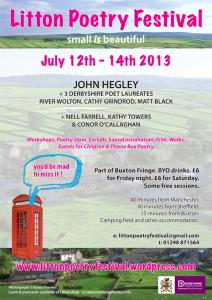Spoken Word Reviews
FIRE AND ICE - Matlock Storytelling Cafe

The art of storytelling has been passed down across human history as a way of socialising, communicating and educating. Now, three performers from the Matlock Story Telling Café come to give a small snippet of this ancient tradition, telling folk stories that have been passed around via word of mouth. Some are recognisable from our own culture and fairy tales, while others have travelled in from overseas. The performers add their own little twists to their tales, adjusting them where they feel they can improve them, or adapting them for a specific audience. Mike Payton and Helen Appleton especially seem to connect with the stories they tell, and adjust happily between staying firmly in character and giggling with the audience when it feels right.
The trio create a warm, welcoming atmosphere, where everyone feels included. The performers ensure to maintain eye contact with each audience member, and often ask questions to adapt their stories.
There is a wide scope in styles between the three performers, meaning that each story is fresh. While there is some variation in acting and storytelling ability, they work hard to keep the audience active and engaged - often making the stories deliberately ambiguous so as to let our imaginations run wild.
Ariane Dean
JUST FOR A MOMENT... - Mark Gwynne Jones

Mark Gwynne Jones is something of a Fringe legend in these parts. I've always heard him talked of in glowing terms following his previous visits here, and so I thought I'd avail myself of the opportunity to see him on his latest venture - 'Just a moment'.
For 'Just a moment' Mark Gwynne Jones appears without his long-time collaborators The PsychicBread and depends upon his storytelling and poetry to tackle a range of subjects that circulate in the vortex surrounding 'the moment'. Madness, locality, sex, loneliness, death, recycling and more flit through what at times is almost a stream of consciousness. He delivers it in an array of tones and tenors, shouts and whispers; the emotional tone of the material constantly shifts, giving an edgy feeling to the whole show.
While the material was good, I have mixed feelings about the show as a whole. MGJ appeared just too relaxed, we were late starting, early finishing and had a break for drinks which seemed a little unwarranted. A two hour show became a one hour one. The short film was not prepared before the start and as a result file searching on Windows by members of the team became a part of the show. Later on a section of the audience gave the distinct impression they were family or friends which alters I think, the ambience of a show. I saw the show with someone who had also heard good things about MGJ and they too were disappointed, by these same issues.
Maybe it was a one off? I don't know. If MGJ can iron out these crinkles in what is otherwise a good show then he has the makings of a very good one.
Ian Parker Heath
LITTON POETRY FESTIVAL - Litton Poetry

"Litton Church has unstained glass windows -
Sitting inside you can see the trees waving.
The high smooth walls are plainly unadorned,
Tastefully washed over in pale pastel shades.
Today it is home to the smallest poetry festival
And the sold-out reading has stuffed the pews.
It's an audience, not a congregation, now and
The scenting wine is chardonnay not communion -
Not sipped in silence with a thankful prayer
But enjoyed in the excited company of those
Not-quite-believing what they see and are about to hear.
Gathered to recall mother, teacher and Derbyshire laureate
Ann Atkinson - missed, absent - certain she would agree
That this weekend of reading and writing - oh
And there will be modest drinking and hot dancing -
Is the very best that we can do."
[With apologies]
Two years ago the village of Crowdecote delivered a memorable Fringe highlight with poets Roy Fisher and Ian McMillan. It very much looks like Litton has repeated the trick - perhaps going one better by laying on a weekend-long Poetry Festival. Much of the emphasis is on writing - and the village telephone box and shop window are decorated with poems, many written by local schoolchildren.
Over the course of the weekend there are workshops with Nell Farrell, Conor O'Callaghan, Mark Gwynne Jones, River Wolton and - for children - David Harmer. There is also to be a ceilidh in the Village Hall, a film "Bright Star" about Keats and readings by three Derbyshire laureates. The first night, though, was very much about poetry as performance and four very different poets were on hand.
John Hegley is a disarming performer - seemingly casual but precisely delivered. We heard some of his 'greatest hits' - 'Eddie Don't Like Furniture' and 'Luton Bungalow' - indeed we were part of the performance. Special mention to Karl from Chapel-en-le-Frith who was Section C in the audience participation. John also read from his newest collection, "Peace, Love and Potatoes". [There was an animated discussion and vote on the best way to roast potatoes - the par-boilers prevailing].
Also reading was Conor O'Callaghan who tried to get away with a translation of Lorca's "The Unfaithful Housewife" only but was required to read a short second poem. Conor clearly believes you should leave them wanting more.
Nell Farrell decided that four was a safe number of poems and included the title piece from her collection - A Drink With Camus After The Match. Anyone who kept an allotment would sympathise with another poem about the damage done by vandals and pigeons. Most of the women in the audience would understand her account about learning to wee out-of-doors.
After the interval we heard Kathy Towers who read 10 short poems prompted by Dr Bach's Flower Remedies and a longer Elegy for her parents - inspired, in part, by a fondness for JS Bach's Double Violin Concerto. All four poets captured the complete attention of the audience of more than 100 squeezed into the Church.
As we left the Church there was a further treat and surprise - a soundscape playing from churchyard trees. A special ending to the beginning of the first Litton Poetry Festival.
Keith Savage
SOUVENIRS - Palabras Latinas

Prepare to be charmed as troubadour Mike Payton and smiling, glamorous Brazilian storyteller Ana Lines take us on a whirlwind journey across continents, gathering stories as souvenirs.
As we sit at candlelit tables at the start of the evening, Mike bursts in behind us with his guitar, demonstrating a beautiful and surprisingly Latin-sounding singing voice. His strong opening number, Caminante No Hay Camino, proves the springboard for the first of many enticing stories of kings and queens, animals, magic and morality.
There are tales within tales but there is also the over-arching story of Mike and Ana's volatile relationship as they travel the world together. In one of the most affecting parts, Ana's smile fades as she recalls being abandoned by him in Rio during the Carnival. In a place where she should be happy amongst her own people, she feels desperately alone and journeys into the Rainforest where under an ancient tree, an old woman taps her on the shoulder with a story to tell...
Though not a couple in real life, Mike and Ana have a real rapport with each other (and us) and I wondered whether they might consider developing their relationship scenes a little more, giving us a little more context to their flare ups for example. Music and dance can speak louder than words however and this romantic evening also includes passionate tango and salsa demonstrations plus a touching closing song - 'No sei perque te quiero' (I don't Know Why I Love You).
More of Mike's fantastic singing would add even more variety to the show but storytelling is the main focus here and there are a wealth of unusual, witty and captivating tales from Greece, Norway, Italy, Africa and other exotic locations. With his ability to transform himself easily into different characters, Mike will also be worth catching amongst the Matlock Storytelling Café group performing Fire and Ice at The Source on Jul 19 and 20 as part of the Fringe.
All these performers need now is a bigger audience so bring your friends and prepare to party!
Stephanie Billen
THAT'S NOT HOW YOU SPELL PEDANTIC - Jim Higo

Jim Higo joins the growing throng of writers/artists a) heading to Edinburgh and b) who find the mindless, unthinking and plainly wrong doings of others hugely irritating and bemusing. The fact that Jim seems to have come late to pedanthood, having only been recently diagnosed by an erstwhile girlfriend, has not detracted from his constant sense of injustice and on occasion outrage at the trouble others have at getting the unbelievably simple wrong.
Grammar, buzz-words (oh dear is that one?), cultural imports of varying kinds, politics and more all make the hit-list, and most for good reason I think you'll agree. There are a number publications that have also tackled some of the subject targeted here, Lynne Truss' "Eats, Shoots & Leaves: The Zero Tolerance Approach to Punctuation" is probably the most well known of late. That there are so many targets may suggest that they are easy game, but there is often a serious point underpinning this. Now Jim, don't get started, but I recently saw the word Shrek displayed as an adjective in a school exhibition. If such fundamental mistakes are not addressed at an early stage, Jim and others have a long and fruitful career ahead of them.
At times he reminded of another wordsmith - John Cooper Clarke - not a bad comparison it must be said. There were a couple of contrived jokes, but it is a comedy show, rather than 'spoken word'. The audience really liked the show and there was a spark between the parties, sometimes absent from other shows I've seen this Fringe. Jim has a manifesto which I believe all right-minded people should get behind. Go and see the show, your country needs you!
Ian Parker Heath
WHEN THE OLD MAN DIED - Steve Bellwood

Steve Bellwood looks and sounds familiar. With his perma-tan (the sort you don't get in this country unless you're a builder), fashionably long (for a man of his age) hair, middle distance gaze and accent that can best be described as transatlantic Yorkshire, he comes across like one of those talking heads you get in BBC4 music documentaries. Maybe he was a studio engineer for Fleetwood Mac or a session guitarist who joined Wishbone Ash for an ill-fated tour. Truth is, we'll never know. Not on the basis of this show. For Steve Bellwood is not the star of it. His Dad is.
When The Old Man Died is part monologue, part character-sketch, part therapy and part untrammelled stream of consciousness. Using the death of his father as a starting point Bellwood takes us on a philosophical journey on the possibility of an after-life and the search for meaning within this one. The longer the monologue continues the longer you get the feeling that this is a somewhat desperate search. For Bellwood is thoroughly all-encompassing in his approach, never rejecting any ideas. Hence, he is occasionally like a Buddhist monk meditating on a mountain top, but equally he is occasionally like a pub drunk who has backed you into a corner and won't shut up.
I suspect that Bellwood himself would be the first to admit that his show has no message, inasmuch as it is more about the journey than the arrival. And as such, he makes sure that journey is filled with incident. His own near-death experience in a fast-flowing American river is described with vivid clarity.
Bellwood clearly has a way with words, but his writing lacks consistency. Sometimes he nails an experience with a perfect nugget of verbal profundity. Often, however, he sums it up with the phrase, "pretty f***in' freaky ..."
The character portraits of his family provide, by far, the most successful elements of the evening. His father, an unreconstructed Northern sexist socialist, is everything that that set of contradictions imply, and more. His bewilderment at being 'no longer a man, so therefore, what ...?' is especially touching. As is the portrayal of his mother, now with dementia, comprehending yet uncomprehending of the imminent tragedy of her husband's illness and inevitable death.
This is not an easy evening at the theatre. Performing it comes across as a necessarily cathartic experience for Steve Bellwood. Furthermore, it forces us to confront not only our own mortality, but the mortality of those we love. But these are notions that should, perhaps, be addressed more often. Bellwood has shown courage in a very un-British way, and for that he should be applauded.
Malcolm Lomax